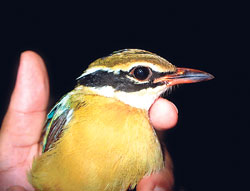Suranga had just finished his morning workload when he heard the raucous cawing of a flock of crows. He looked to see what the commotion was all about. For a moment, he thought a rainbow had fallen from the sky. But it was only a multi-coloured bird which, fluttering weakly, landed near him. Gathering all its remaining strength, it tried to fly but ended up getting stuck in the nearby AC. Suranga with his fellow workers at the Delmege Company rescued the bird, placing it carefully in a cardboard box.
“We never expected to find such a beautiful bird in a congested Colombo neigbourhood like Maradana,” said Chandana Hettiarachchi, Maintenance Manager of Delmege. A bird lover himself, Chandana identified the bird as an Indian Pitta known as Avichchiya in Sinhala and called the Dehiwela Zoological Gardens for advice on how to treat it.
Though the Indian Pitta feeds on insects and worms, this Pitta had happily eaten the fruits and rice offered to him. It was also drinking water showing signs of early recovery, so the rescuers kept the bird in its box in a dark corner without disturbing it. After a few days, its strength regained it flew off to explore its new territory.
This is not the only instance of an exhausted Indian Pitta being rescued in Colombo during the migration season. The Field Ornithology Group of Sri Lanka (FOGSL) too reported two Indian Pittas found in Colombo a few weeks ago. One of them died of exhaustion, but the other recovered and flew away, much to the delight of the rescuers.
“It is not uncommon to find exhausted Indian Pittas at the start of the migration season. They are not sick, but get disoriented after the long journey,” explained veteran Ornithologist Prof. Sarath Kotagama. He advised that the troubled birds be fed with mild sugar syrup and if unable to fly, provided a safe place away from possible predators, until they are fit to fly again.
The Indian Pitta is called Aru-mani-kuruvi in Tamil which means the 6 ’o clock bird and its loud, clear double whistle ‘wheet-tew’, can be heard in the morning and evening around 6 ’o clock. So listen for this unmistakable call – it maybe a visitor from the Himalayas.
If you see a troubled migrant
There may be exhausted late comers who may still land on your doorstep. Dr. Deepani Jayantha offers some tips on helping them.
- An exhausted or injured bird could be fully conscious, semi-conscious or unconscious. Such a bird should be protected from dogs, cats, rats, crows, shikras etc. Keep them in a dark, quiet and warm place. Handle them gently only if necessary and never force-feed a semi-conscious or unconscious bird.
- If it is too weak to fly on its own; try giving it small amounts of low concentrated glucose saline with Vitamin C.
- If the bird is able to fly, release it as soon as possible in a proper environment.
- If it is necessary to keep the bird for a few days for medical care, provide a proper cage (avoid injurious materials) with a perch protected from predators. Attend to traumatic injuries (broken bones) as necessary - if extensive care is needed, consult a veterinarian
- Provide clean food and water.
|

